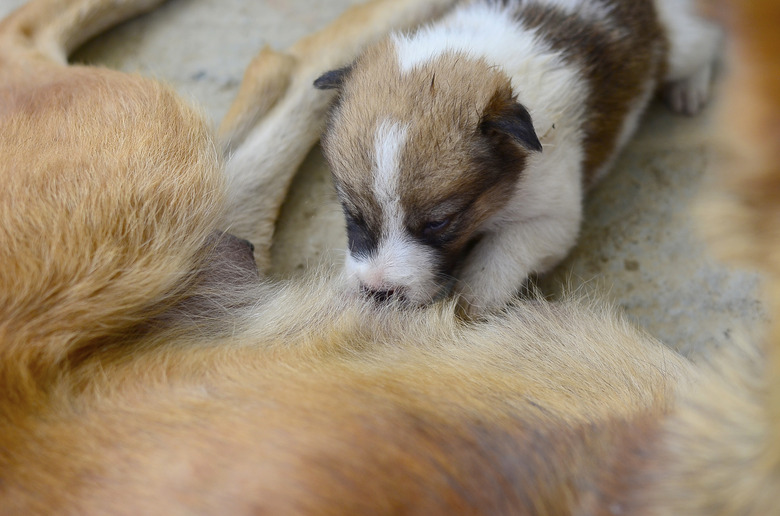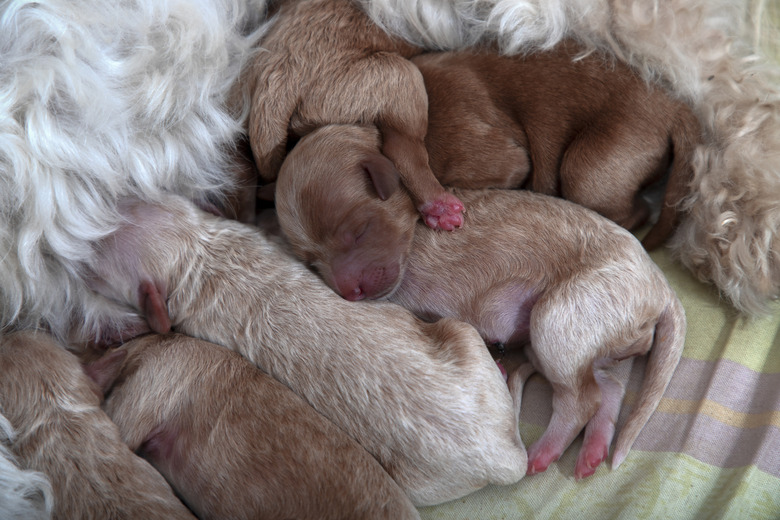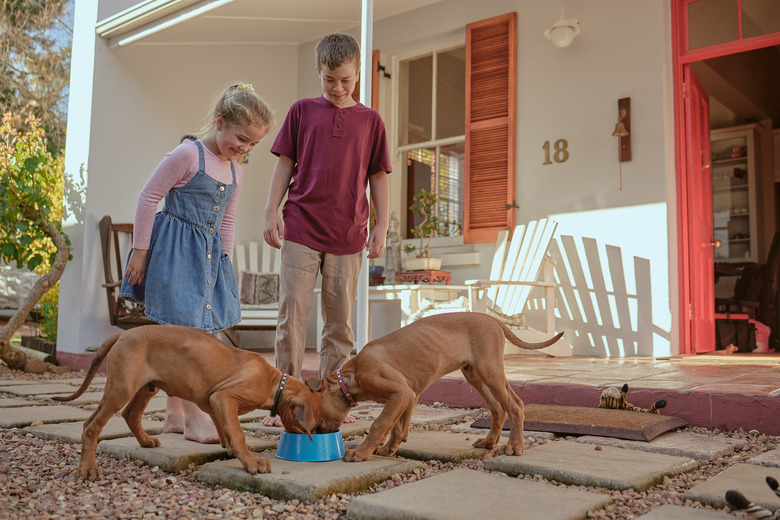Is It Normal For Dogs To Have Diarrhea After Pregnancy?
Diarrhea after whelping can be common, but that doesn't mean it should be ignored. Chances are when your dog delivered her puppies, she was very thorough in her work, even cleaning up after herself in the process. It's normal for mother dogs to eat the placenta during the delivery process. If your dog took care of this bit of housekeeping, don't be surprised to see a bit of diarrhea for a couple of days after delivery.
Normal post-whelping dog poop can be loose stool
Normal post-whelping dog poop can be loose stool
There is nothing wrong or bad with your dog eating her babies' placentas; it is the natural thing for her to do. However, her belly may not feel so good as a result, causing a touch of diarrhea. And if she's gorging herself on puppy food, which is helpful for providing herself and her pups with the nutrition they all need while she's nursing, the increased portions may be prompting a bit of loose stool.
Be careful not to overfeed her, as it could cause mastitis. If her diarrhea doesn't clear up after a couple of days, you should contact the veterinarian to make sure she's healthy.
Problematic causes of a dog's loose poop
Problematic causes of a dog's loose poop
If the diarrhea persists or if she shows a loss of appetite, or if she has a temperature, call your veterinarian immediately. She may have a bacterial infection that will require antibiotics.
While some loose poop is normal after whelping, prolonged diarrhea can be indicative of other health problems. If she is having diarrhea try introducing a bland diet, like boiled chicken and white rice. Make sure that she stays hydrated by offering her broth in addition to free access to clean, fresh water. This should not affect her milk production if she remains hydrated and nursing.
Dog diarrhea caused by parasites
Dog diarrhea caused by parasites
It is very common for some mother dogs with new puppies to have dormant parasites that do not cause health problems until after whelping. Roundworms, giardiasis, and coccidia are a few of the most commonly seen parasites. They are typically accompanied by loose, watery, mucousy, or foul-smelling poop. They can be diagnosed by having your veterinarian run a fecal analysis.
Your veterinarian will typically prescribe a medication to help rid the mother dog of the parasites. Metronidazole is a common treatment for both diarrhea and giardia, but it has been known to cause birth defects and can be harmful to new puppies, so it must be used with caution if at all. Fenbendazole is a safer option for mom and the puppies.
Home remedies for a dog's loose stools
Home remedies for a dog's loose stools
The first step to combatting loose stools is to try a bland diet or low-fat dog food. Another option is to administer a probiotic to the mother dog. There are many supplements available to help aid digestion, and there are numerous probiotics on the market. Ask your veterinarian for their preferred probiotic and start your dog on it before she whelps.
Adding some canned pumpkin to her dog food is also an option, as the starch can help stop dog diarrhea.
New puppies with loose stools
New puppies with loose stools
While it may be common for mother dogs to have some gastrointestinal upsets after whelping, it is always a concern if new puppies show any diarrhea. Newborns are delicate and can easily become dehydrated.
If your puppies are having diarrhea, check their temperature and then use a cotton ball to stimulate them to urinate. If they are properly hydrated, their urine should be colorless. If it is dark yellow, they are dehydrated.
Call your veterinarian to discuss treatment options, which could range from a probiotic paste to boost their gut flora to antibiotics if they are having more serious health problems.
Other dog postpartum complications
Other dog postpartum complications
Keep your eyes open for other postpartum complications. There are a variety of conditions to which a new mother dog is vulnerable, including eclampsia (low calcium), mastitis (inflammation of the mammary glands), and postpartum metritis (inflammation of the uterus).
Contact your veterinarian immediately if your dog shows signs of a loss of appetite or fever; if she is nervous, hypersalivating, and panting; if she has red mammary glands that are sore or hot to the touch; or if she's not tending to her pups. Eclampsia, mastitis, and metritis are veterinary emergencies.
The bottom line
The bottom line
A female dog having some diarrhea after whelping is to be expected, but if she is having accidents in the house and it is persistent or anything worse than slightly loose poop, she needs to be seen by a veterinarian to rule out any infections or parasites and to make sure she and the puppies remain as healthy as possible.


